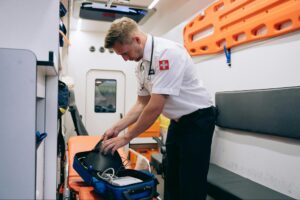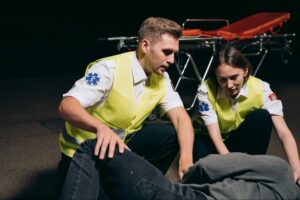
Being involved in a car accident can be a traumatic experience, with physical and psychological consequences that may surface immediately or manifest in the days, weeks, or even months following the incident.
Knowing what doctor to see after car accident is crucial to ensuring that both your physical and mental health are well-maintained. This article will explore the types of injuries one could sustain, the importance of immediate medical attention, and the roles various specialists play in recovery.
Understanding the Impact of Car Accidents on Health
When individuals think about the consequences of a car accident, physical injuries often come to mind first. However, the implications of an accident extend beyond just visible wounds.
Both physical and emotional traumas are involved, often requiring comprehensive treatment strategies. The aftermath of a car accident can disrupt daily routines, affect relationships, and even alter one’s outlook on life.
Understanding the full scope of these impacts is crucial for recovery and rehabilitation. Howe.Law can help ensure you navigate the complexities of recovery while securing the compensation you deserve.
Physical Injuries from Car Accidents
Physical injuries from car accidents can vary widely in severity and type. Common physical injuries include:
- Whiplash and neck injuries
- Fractures and broken bones
- Soft tissue injuries
- Traumatic brain injuries (TBIs)
- Internal injuries and bleeding
Recognizing that even seemingly minor accidents can result in significant injuries is essential. Some injuries may not be apparent immediately but can worsen if left untreated.
For instance, whiplash, a common injury in rear-end collisions, may not show symptoms until days later, leading to chronic pain and discomfort. Additionally, fractures can lead to long-term complications, such as arthritis, if not properly managed.
Early diagnosis and intervention are critical to prevent further complications and to ensure a smoother recovery process.
Emotional and Psychological Effects of Car Accidents
Beyond physical injuries, car accidents can leave lasting emotional scars. Many individuals experience:
- Post-Traumatic Stress Disorder (PTSD)
- Anxiety and panic attacks
- Depression
- Fear of driving or getting into a vehicle again
These emotional ramifications can significantly affect one’s overall quality of life and must be assessed and treated alongside physical injuries.
The psychological toll of an accident can manifest in various ways, including difficulty concentrating, sleep disturbances, and withdrawal from social activities. Support from mental health professionals, alongside peer support groups, can play a vital role in helping individuals navigate their feelings and fears post-accident.
Furthermore, the journey to emotional recovery may involve therapeutic techniques such as cognitive-behavioral therapy (CBT), which can help individuals reframe their thoughts and develop coping strategies for anxiety and fear related to driving.
The Importance of Immediate Medical Attention
Seeking medical attention right after a car accident is crucial. Delayed treatment can lead to more severe complications or even chronic health issues that could have been avoided with prompt care.
Identifying Hidden Injuries
Many injuries may not be immediately identifiable. For instance, internal bleeding or concussions might not exhibit immediate symptoms but can have dangerous outcomes if unresolved.
Immediate evaluations help to ensure that these hidden injuries are identified and treated as early as possible. Additionally, some injuries may manifest subtle signs, such as mild headaches or fatigue, which can easily be overlooked in the chaos following an accident.
A thorough medical examination can uncover these issues, allowing for appropriate interventions to prevent further health deterioration.
Preventing Long-Term Complications
Timely medical intervention can significantly mitigate the risk of long-term complications. Injuries like whiplash can evolve into chronic pain conditions if not addressed promptly.
Visiting a healthcare professional following an accident can enhance your chances of a full recovery and reduce the risk of ongoing issues. Furthermore, early treatment often includes physical therapy and rehabilitation, which can play a vital role in restoring mobility and function.
Engaging in these proactive measures not only aids in recovery but also empowers individuals to regain control over their lives, minimizing the psychological impact that often accompanies physical injuries.
The Role of Documentation
In addition to the health benefits, seeking immediate medical attention provides essential documentation of injuries, which can be crucial for potential legal claims.
Medical records serve as vital evidence in establishing the extent of injuries sustained during the accident, which can influence insurance settlements and legal proceedings.
A clear and comprehensive medical history can strengthen your case and ensure you receive the compensation you deserve for medical expenses, lost wages, and pain and suffering.
This documentation also helps healthcare providers tailor a treatment plan that addresses both immediate needs and long-term recovery goals, ensuring that all aspects of your health are considered after the accident.
Different Types of Doctors You May Need to See

After a car accident, various medical professionals may play an essential role in your recovery. Here’s a breakdown of the types of doctors you may consider consulting:
General Practitioners and Family Doctors
Your first point of contact after a car accident may be your general practitioner (GP). They can provide an initial assessment, treat minor injuries, and refer you to specialists for further care as necessary.
In addition to physical injuries, GPs can also help monitor your overall health and well-being during the recovery process, ensuring that you are not developing any complications that may arise from the accident.
They often maintain a comprehensive medical history, which can be invaluable in guiding your treatment and recovery plan.
Orthopedic Doctors and Chiropractors
For musculoskeletal injuries, orthopedic doctors can help manage fractures and injuries related to bones, joints, and muscles. Chiropractors focus on spinal manipulation and may assist in alleviating pain and restoring function, especially in cases of whiplash.
These specialists often collaborate to create a holistic treatment plan that addresses immediate pain relief and long-term recovery strategies. They may also incorporate physical therapy into your rehabilitation, enhancing mobility and strength and allowing you to return to your daily activities more quickly and safely.
Neurologists and Neurosurgeons
If you have sustained a head injury or are experiencing neurological symptoms such as headaches or confusion, consulting a neurologist is vital. They specialize in brain and nervous system disorders.
In severe cases, a neurosurgeon may be needed for surgical intervention. Neurologists can conduct various diagnostic tests, such as MRIs or CT scans, to assess the extent of your injuries and develop a tailored treatment plan.
They may also provide ongoing care and monitoring to ensure that any symptoms are managed effectively and that you are on the path to recovery.
Psychologists and Psychiatrists
Addressing the psychological ramifications of a car accident is equally important. Psychologists can provide therapy and help you cope with emotional distress, while psychiatrists can prescribe medications if necessary for mental health conditions like PTSD or anxiety disorders.
The emotional impact of an accident can manifest in various ways, including anxiety, depression, and even survivor’s guilt. Engaging with mental health professionals can provide a safe space to process these feelings and develop coping strategies.
Support groups may also be recommended. They allow you to connect with others who have experienced similar traumas and foster a sense of community and understanding during your healing journey.
The Role of Each Doctor in Your Recovery
Each type of doctor plays a unique and critical role in your rehabilitation journey. Understanding these roles can help you manage your recovery effectively.
Initial Assessment and Ongoing Care
During your initial visit, your general practitioner will perform a thorough assessment to identify injuries. They may conduct physical exams, take X-rays, or recommend blood tests to determine the extent of any injuries sustained.
They will refer you to specialists for further evaluation based on their findings. This initial step is crucial, as it sets the foundation for your entire recovery plan.
Your general practitioner will also monitor your progress over time, adjusting your treatment plan as necessary and ensuring that all aspects of your health are being considered.
Specialized Treatment and Rehabilitation
Once referred, specialists such as orthopedic doctors or chiropractors will conduct targeted assessments and develop a treatment plan tailored to your unique needs. Depending on the severity of your injuries, this plan may include physical therapy, medications, or surgery.
Physical therapists, for instance, will work closely with you to improve mobility and strength through personalized exercises, helping you regain function and confidence.
Additionally, they may incorporate modalities like ultrasound or electrical stimulation to enhance healing and reduce pain, ensuring a comprehensive approach to your rehabilitation.
Mental Health Support and Therapy

A vital aspect of recovery involves addressing emotional health. Psychologists and psychiatrists can offer support through talk therapy, cognitive-behavioral therapy (CBT), or other therapeutic approaches.
This mental health support is crucial not only for emotional healing but also for the overall recovery process. Engaging in therapy can help you process the trauma of the accident, develop coping strategies, and rebuild your sense of self.
Moreover, support groups may also be beneficial. They provide a space to connect with others who have experienced similar challenges and foster a sense of community and shared understanding.
In addition to traditional therapy, integrating mindfulness practices such as meditation or yoga can further enhance your mental well-being during recovery. These practices promote relaxation and stress reduction, which are essential for physical and emotional healing.
Addressing the psychological impacts of your injuries can create a more holistic recovery experience that acknowledges the interconnectedness of mind and body. This multifaceted approach not only aids in overcoming immediate challenges but also equips you with tools for long-term resilience and health.
Conclusion
Recovering from a car accident requires immediate medical care and the right specialists to ensure a complete recovery. Address both physical and emotional impacts for a smoother healing process.
Ready to take the next step in your recovery? Contact Howe Law for a free consultation at 888-559-7612. We’re available 24/7 to help you get the support you deserve. Click here to reach out now!
Related Articles


























































